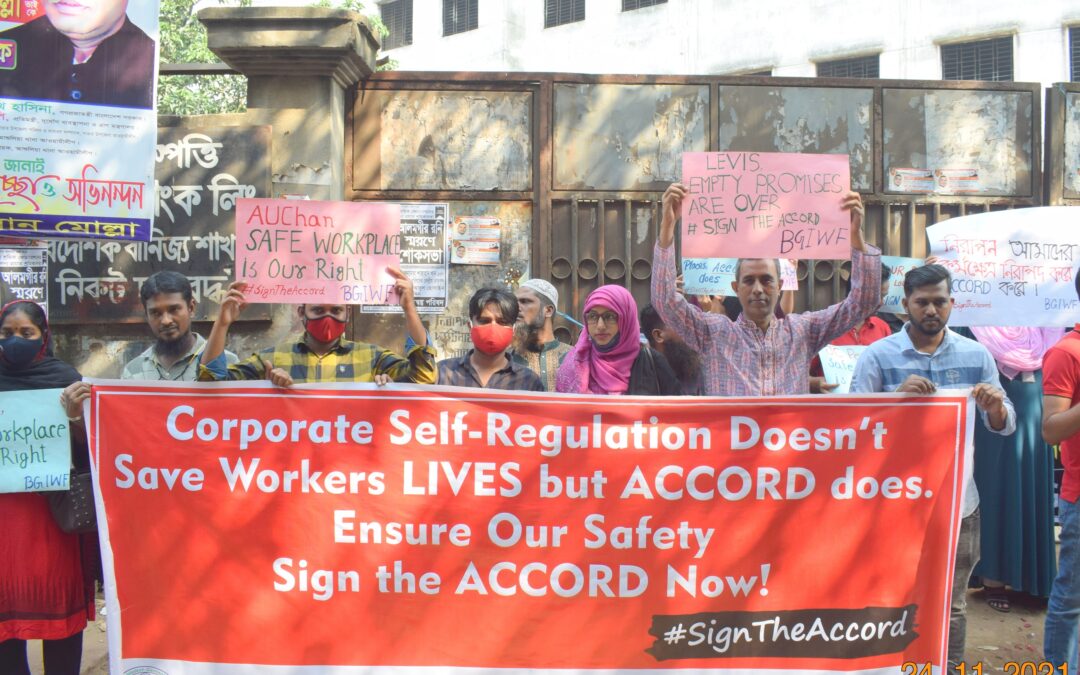
Dec 1, 2021
November 24 is a symbol of the fight for a decent and safe workplace for more than 4 million garment workers in Bangladesh. On that day nine years ago, Tazreen Fashion factory in Ashulia, on the outskirts of Dhaka, went ablaze taking the lives of 117 workers and injuring more than 200. Those who escaped still bear the marks of their pain, and many are unable to return to earning a normal livelihood.
“Factory gates must never be padlocked. This is an inhumane treatment of my workers. It was due to this kind of attitude that led to the demise of so many workers as they could not escape during the fire”, says Rashadul Alam Raju, general secretary of the Bangladesh Independent Garment Union Federation (BIGUF). In the ensuing investigation, investigators also found that the factory lacked adequate emergency exits and the fire safety certificate had expired.
To mark the ninth anniversary of the tragic fire, worker leaders gathered all around Bangladesh to ensure that this kind of incident never reoccurs. They demanded regular factory inspections to ensure safety, adequate compensation for the victims in line with International Labor Organization Convention 121, medical services for the injured, and Tazreen Fashion management to be brought to justice for their negligence toward workers’ safety.
Babul Aktar, general secretary of Bangladesh Garment and Industrial Workers Federation (BGIWF), says that “the development we see around us is due to the hard work of our garment workers who bring in the foreign currency that drives our industries, development projects and our economy. We can never be negligent about their safety and security at work. Our garment industry will prosper only if its workers are free from fear of losing their lives at work.”
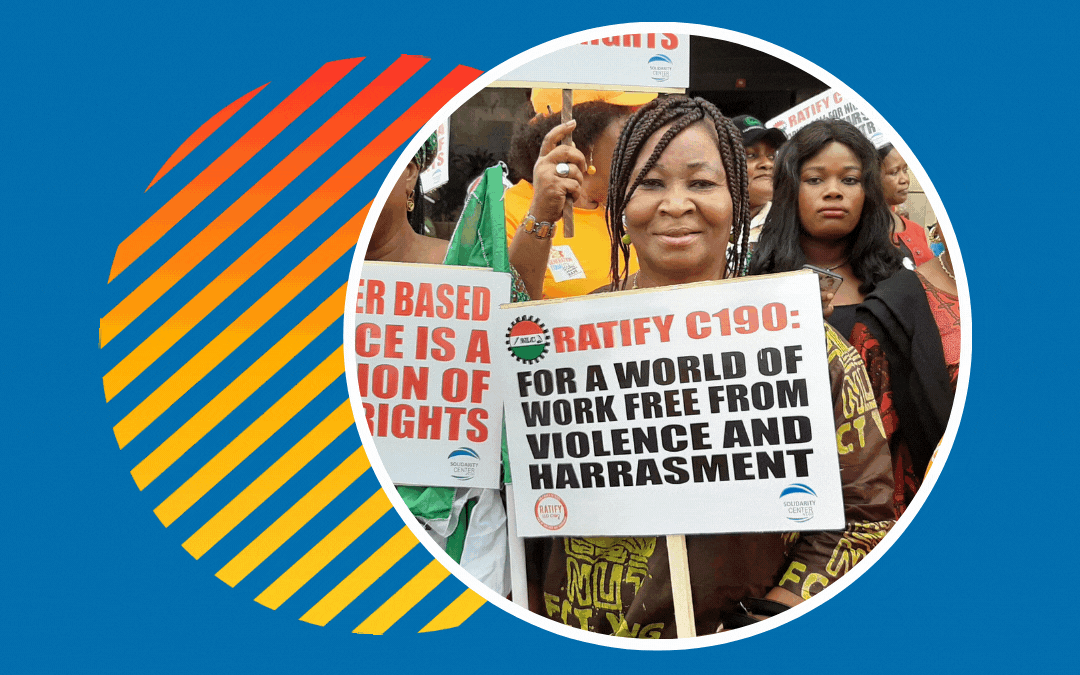
Nov 17, 2021
Union women are not waiting for their governments to ratify Convention 190, the international treaty that addresses gender-based violence and harassment in the world of work—they are taking action now to ensure workers benefit from the powerful rights it provides, according to Rita Goyit, speaking on this week’s Solidarity Center Podcast.
“We are taking concrete measures while we wait for the ratification,” says Goyit, head of the Nigeria Labor Congress (NLC) Department of Women and Youth and secretary of the NLC’s National Women Commission.
With support of the NLC and Solidarity Center, union activists conducted an informal survey of more than 900 women workers in Abuja and Lagos and found 57 percent had experienced GBVH at work, yet 20 percent did not report it for fear of employer retaliation.
“What was common about the story is that sexual harassment, gender-based violence exists in the workplace,” Goyit tells Solidarity Center Executive Director and podcast host Shawna Bader-Blau. “And it was not treated as a workplace issue.”
Through outreach and training, Nigerian unions are reaching workplaces as diverse as garment factory floors and sprawling informal markets, where workers put in place what works for them, like anonymous suggestion boxes to report harassment.
Goyit says union women are developing strategies that “will really address gender-based violence in the workplace because this is a worker-specific issue, it’s coming from with the workers ourselves.
“We’re putting our heads together until we find the solution … because the women are with us. Because I feel strong when I see the other women around me in our campaigns, in the negotiations that we do.”
More from The Solidarity Center Podcast!
Listen to this and all Solidarity Center episodes here or at Spotify, Amazon, Stitcher, Castbox or wherever you subscribe to your favorite podcasts.
Download recent Season Two episodes:
The Solidarity Center Podcast, “Billions of Us, One Just Future,” highlights conversations with workers (and other smart people) worldwide shaping the workplace for the better.
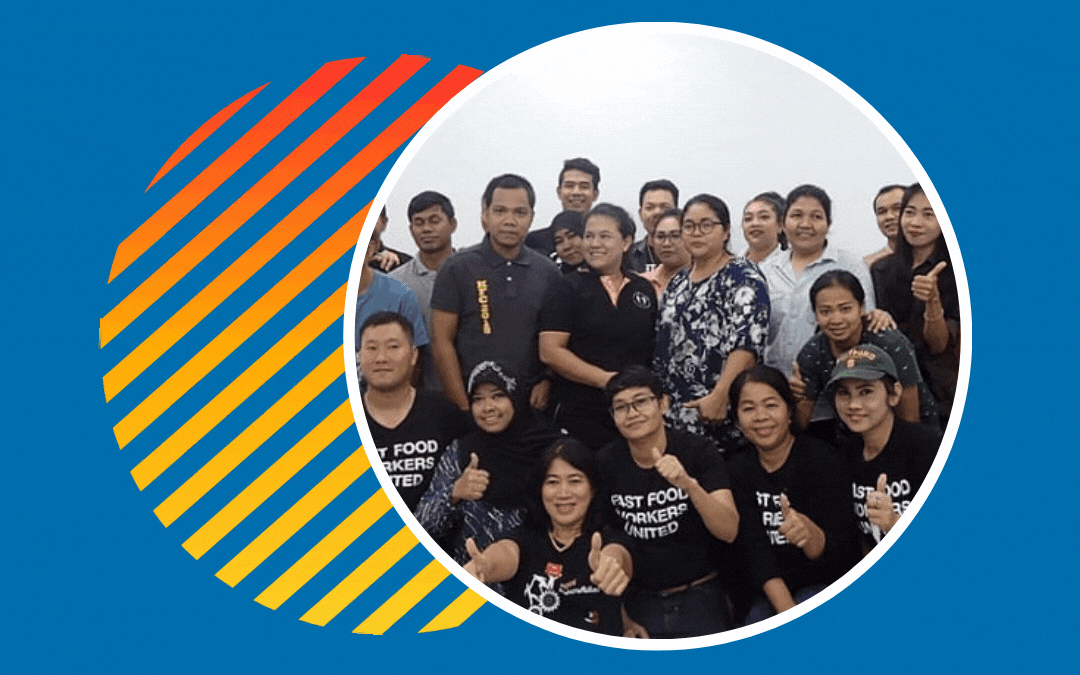
Nov 10, 2021
The Fight for $15 movement in the United States, in which workers seek a living wage and a union, is part of a global struggle by fast food workers often employed by the same multinational corporations that make massive profits even as their employees struggle to get by.
In Thailand, Apantree Charoensak, a former union leader who led the campaign to organize fast food workers at KFC, describes on this week’s Solidarity Center Podcast how workers overcame the company’s opposition to successfully form a union and win better wages and working conditions.
“The company knew that if the demands were successful, it would impact 70 percent of the workers which, back then, there were about 18,000 workers. So they pressured and threatened me a lot,” she tells podcast host and Solidarity Center Executive Director Shawna Bader-Blau. “They said they would get me out of the company, if I still tried to help other workers.”
Charoensak says the campaign drew lessons from the U.S. Fight for $15 campaign throughout the years-long effort to form a union.
“It took six years from [when] the union was first organized until we reached the threshold of 20 percent because in Thailand, the law requires that you have to reach over 20 percent of all the workforce before you can file for collective bargaining.”
Catch All Solidarity Center Podcasts!
Listen to this all Solidarity Center episodes here or at Spotify, Amazon, Stitcher, Castbox or wherever you subscribe to your favorite podcasts.
Download recent Season Two episodes:
The Solidarity Center Podcast, “Billions of Us, One Just Future,” highlights conversations with workers (and other smart people) worldwide shaping the workplace for the better.
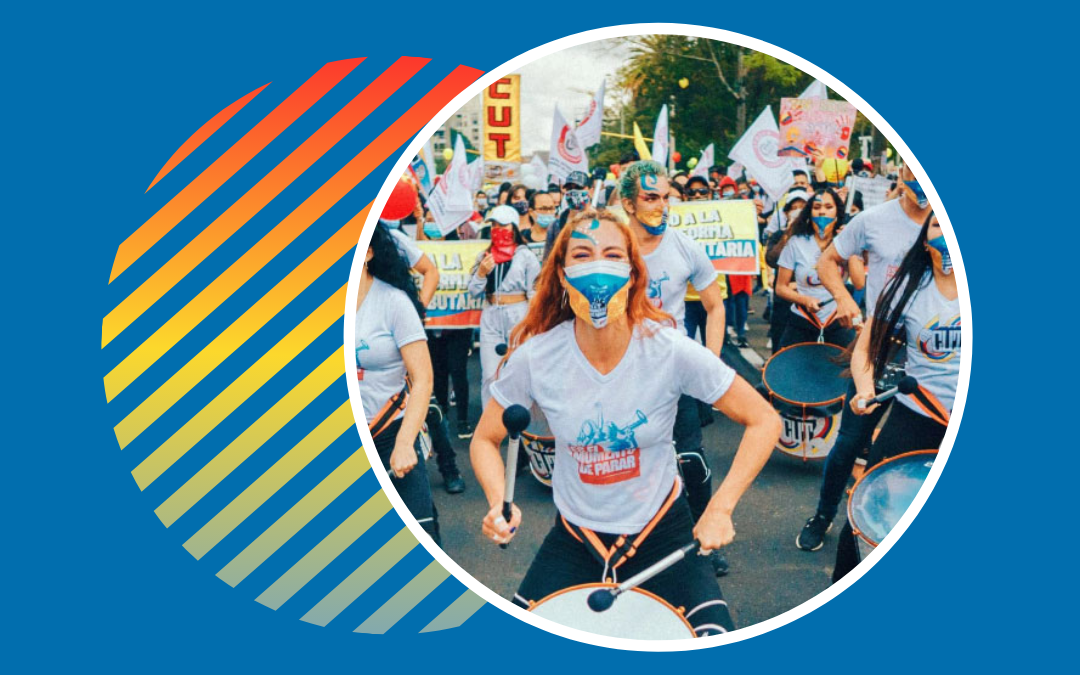
Nov 3, 2021
Police violence, which escalated during COVID-19, is part of a rising tide of global crackdowns targeting marginalized communities, workers and young people struggling to support themselves. The latest episode of The Solidarity Center Podcast looks at how workers in Colombia and Nigeria—targeted by police brutality as they staged peaceful protests to address inequality—are joining and leading large movements to demand new levels of accountability from and reform of the authorities charged with protecting and serving their communities.
Podcast host and Solidarity Center Executive Director Shawna Bader-Blau talks with Francisco Maltés, president of the Unitary Workers Center (CUT) in Colombia, and Gbenga, general secretary and founder of the Federation of Informal Workers’ Organizations of Nigeria. They describe how workers, especially those living most on the edge, are taking back their communities by standing up for justice and opposing decades of widespread, systemic corruption that feeds off state-sponsored violence.
“Justice and police activity in Colombia can be characterized as being directed at poor people,” says Maltés. “The National Strike Committee has proposed a bill for reforming the national police force.”
Catch More from Season Two!
Listen to this and all Solidarity Center episodes here or at Spotify, Amazon, Stitcher, Castbox or wherever you subscribe to your favorite podcasts.
Catch recent Season Two episodes:
The Solidarity Center Podcast, “Billions of Us, One Just Future,” highlights conversations with workers (and other smart people) worldwide shaping the workplace for the better.
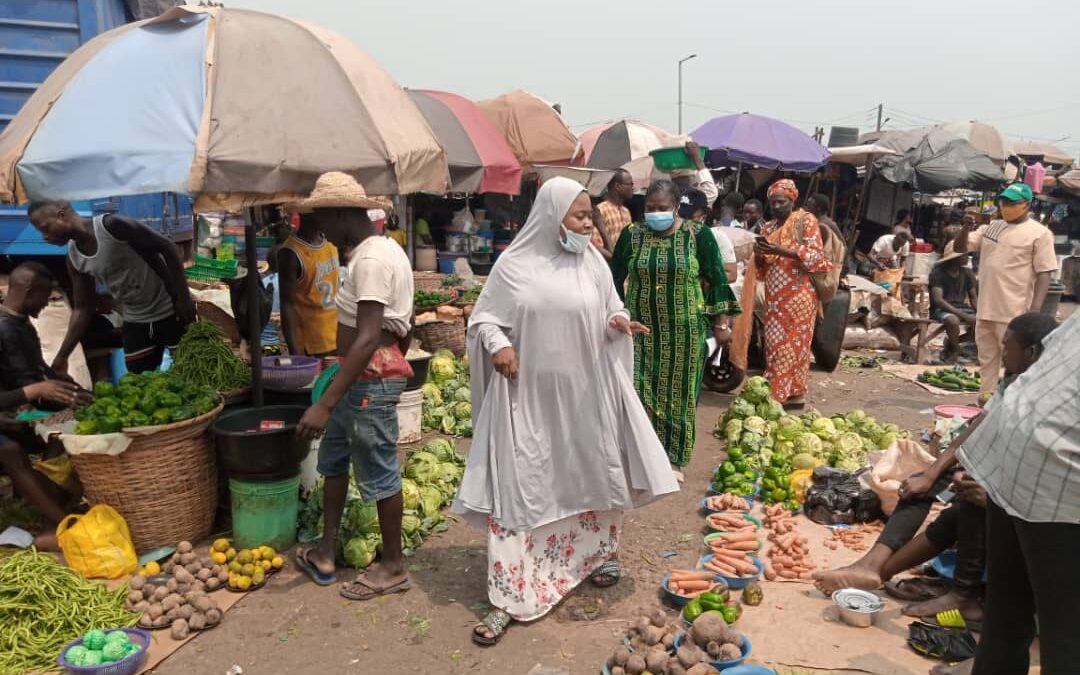
Nov 1, 2021
A magistrate court in Nigeria this week recommended prosecution of a man accused of sexually assaulting a minor in a bustling Lagos open marketplace—and gender rights activists there say the move was the direct result of awareness training conducted with market vendors about their right to violence-free workplaces. Nasiru Umaru, 44, is now in KiriKiri correctional center. The girl was helping her mother make extra money by selling goods, as do many children forced to work in hazardous environments to ensure their families make enough to meet basic needs.
Bringing a case like this is rare in the market, says Onyeisi Chiemeke, an attorney with International Lawyers Assisting Workers network (ILAW), which is aiding with the prosecution. Chiemeke says a newly formed gender-based violence task force in the market brought attention to the alleged rape, and the case now goes to trial in Nigeria’s high court. ILAW, a project established in 2018 by the Solidarity Center, is the largest global network of workers’ rights lawyers and advocates.
Building Synergies to Fight Violence and Harassment
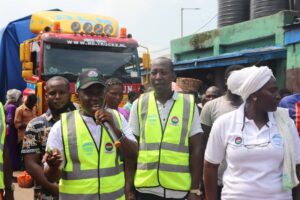
Amina Awal, Hausa language GBVH educator trainer, reaches out to workers in the Mile 12 Lagos market truck park. Credit: Solidarity Center / Nkechi Odinukwe
Following the 2019 adoption of Convention 190 at the International Labor Organization (ILO), union leaders at the Nigeria Labor Congress (NLC), together with the Solidarity Center, began training workers, seeking to put into practice C190’s extensive provisions on preventing and ending gender-based violence and harassment (GBVH) in the world of work.
“I think we are making a lot of progress, a lot of awareness,” says Rita Goyit, head of the NLC’s Department of Women and Youth and secretary of the NLC National Women Commission.
Mile 12 market vendors who took part in the training quickly formed a GBVH task force that worked with the NLC to develop a market code of conduct covering gender-based violence and harassment. The vendors also posted suggestion boxes for reporting GBVH, and the NLC’s Lagos State union chapter leader monitors the submissions and alerts the NLC when necessary.
Vendors also are creating posters to spread awareness and talking with other sellers at the vast, sprawling market, where thousands of people visit each day to buy vegetables, legumes and other food items.
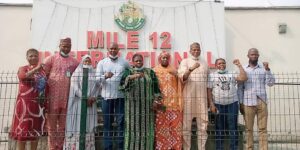
NLC and market leaders at the Mile 12 market in Lagos partnered to raise awareness about gender-based violence and harassment at work. Courtesy: NLC
Key to the success of the trainings, says Goyit, is that they were held in local languages. “That was one of the strategies that really worked—it was a language they understood. People talked one-on-one in the local language.” Vendors from across Nigeria travel to Mile 12, the largest in Lagos, to sell their wares.
The NLC also is joining with unions and allied organizations in urging the government ratify C190. Ratifying an ILO convention signifies a country’s intention to be bound by its terms. Union activists worldwide are campaigning for its ratification, and nine countries have done so.
As the accused man awaits a court hearing, Chiemeke says the synergy between market vendors and lawyers is helping make concrete the rights that Convention 190 provides to violence-free environments.







